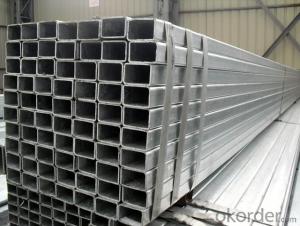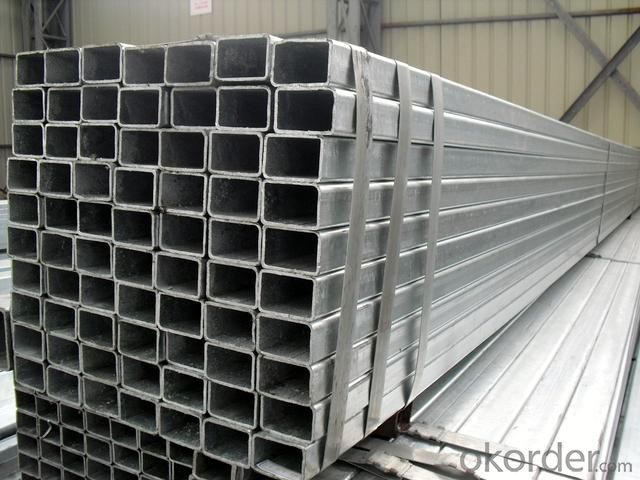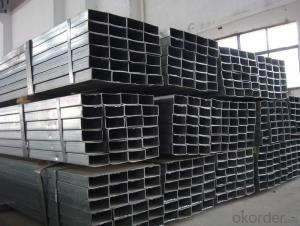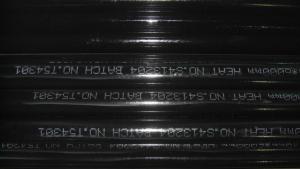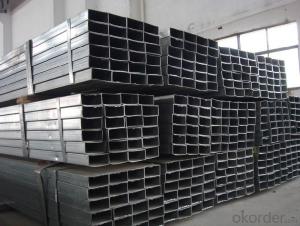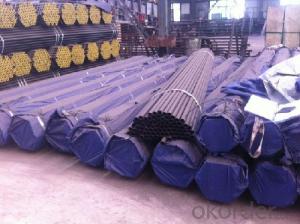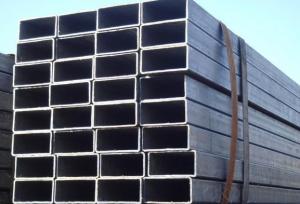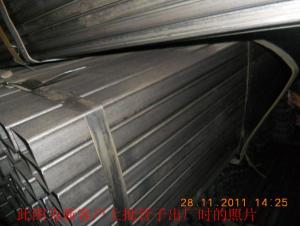Rectangular Hollow Section Pipe 6 meter
- Loading Port:
- China Main Port
- Payment Terms:
- TT OR LC
- Min Order Qty:
- -
- Supply Capability:
- -
OKorder Service Pledge
OKorder Financial Service
You Might Also Like
Product Name | ||
Size | Size: | 10*10--500*500mm |
Thickness: | 0.45--16mm | |
Length: | 3-12m | |
Steel Grade | Q195,Q215,Q235,Q345,16Mn, 20# | |
Standard | ASTM A500,EN10219,GB/T6728,GB/T6725,JIS G3466 | |
Usage | 1. For Structure, Airport, Railway 2. Construction and so on. | |
Ends | Plain end or By Your Choice | |
Surface | Bared Or With Oiled Or Galvanized | |
Technique | ERW ,Hot Rolled and Cold Rolled | |
Section Shape | ||
Inspection | With Hydraulic Testing, Eddy Current , Infrared Test | |
Package | Bags, Bundle, In Bulk, Containers | |
MOQ | 20 Metric Ton / Can Be Negotiated | |
Supply Ability | 15,000 Metric Ton/Month | |
Date of Delivery | 7 days(Qty within 1000 Metric Ton) or According To The Quantity | |
Port of Shipment | Tianjin, China | |
Payment | L/C T/T | |
- Q: What are the different types of steel pipe fittings for industrial applications?
- There are several types of steel pipe fittings commonly used in industrial applications, including elbows, tees, reducers, couplings, flanges, and unions. These fittings are designed to connect and redirect the flow of fluids or gases within a piping system, ensuring proper functionality and efficiency in various industrial processes.
- Q: What are the safety precautions to follow while working with steel pipes?
- When working with steel pipes, it is important to follow several safety precautions to ensure a safe working environment. These precautions include wearing appropriate personal protective equipment (PPE), such as gloves, steel-toed boots, and safety glasses, to protect against potential hazards. It is also crucial to inspect the pipes for any defects or damage before use to avoid accidents. Additionally, workers should be trained on proper handling and lifting techniques to prevent strains or injuries. Finally, it is essential to establish clear communication and adhere to safety protocols, such as using caution signs and barriers, to promote a safe work area for everyone involved.
- Q: How do you prevent freezing in steel pipes during cold weather?
- One effective way to prevent freezing in steel pipes during cold weather is to insulate the pipes. This can be done by applying foam insulation sleeves or wraps around the pipes. Additionally, ensuring that the pipes are properly sealed and any gaps or cracks are sealed can help prevent cold air from reaching the pipes. It is also important to keep the pipes warm by maintaining a consistent temperature in the surrounding area. This can be achieved by using a space heater or by allowing warm air to circulate around the pipes.
- Q: Can steel pipes be used for conveying sewage and wastewater?
- Indeed, sewage and wastewater can be conveyed using steel pipes. The use of steel pipes is widespread in sewage and wastewater systems owing to their robustness and resilience. They possess corrosion resistance and can endure immense pressure and flow rates. Moreover, steel pipes have the capability to manage the rigorous chemicals and pollutants found in sewage and wastewater without impairing or compromising the fluid quality. Nonetheless, it is crucial to guarantee proper coating or lining of the steel pipes to avert any potential problems concerning corrosion or contamination. Regular maintenance and inspections are equally important to detect and rectify any potential concerns that may arise within the system.
- Q: Can steel pipes be used for underground pressure pipelines?
- Yes, steel pipes can be used for underground pressure pipelines. Steel pipes are known for their strength and durability, making them suitable for various applications, including underground pressure pipelines. They can withstand high pressure and are resistant to corrosion, making them a reliable choice for transporting fluids or gases underground. Additionally, steel pipes are available in different sizes and thicknesses, allowing for customization based on the specific requirements of the pipeline project. However, it is important to ensure proper coating or lining of the steel pipes to prevent corrosion caused by soil conditions or the transported substance. Regular maintenance and inspections are also necessary to ensure the integrity and longevity of the underground pressure pipelines made of steel pipes.
- Q: How do steel pipes handle pressure surges?
- Steel pipes are designed to handle pressure surges effectively due to their inherent strength and durability. The high tensile strength of steel allows it to withstand significant pressure fluctuations without deforming or bursting. Additionally, the seamless construction of steel pipes ensures a smooth and continuous flow, minimizing the impact of pressure surges. Furthermore, steel pipes can be reinforced with additional support structures, such as braces or anchors, to further enhance their ability to handle pressure surges.
- Q: Can steel pipes be used for conveying slurry and slurries?
- Steel pipes are versatile and can be used to transport slurry and slurries. They are frequently employed in a range of applications, including the conveyance of fluids, gases, and solids. These pipes are renowned for their durability, strength, and resistance to corrosion, which makes them well-suited for handling abrasive materials like slurry and slurries. To enhance their protective capabilities against wear and tear caused by the abrasive nature of slurries, steel pipes are commonly lined with materials such as rubber or ceramic. The choice of steel grade and lining material depends on the specific requirements of the slurry being transported, including factors like particle size, concentration, and temperature. In summary, steel pipes are a dependable and efficient choice for the transportation of slurries across various industries, including mining, wastewater treatment, and chemical processing.
- Q: What is the difference between hot-dipped galvanized and electro-galvanized steel pipes?
- Hot-dipped galvanized steel pipes are coated with a thick layer of zinc by immersing them in a bath of molten zinc, creating a durable and corrosion-resistant coating. On the other hand, electro-galvanized steel pipes are coated with a thinner layer of zinc through an electroplating process, offering a more economical and aesthetically pleasing option.
- Q: How can steel pipes be protected from corrosion?
- There are several methods available to protect steel pipes from corrosion. One commonly used method is the application of protective coatings, which create a barrier between the steel and the corrosive elements in the environment. Epoxy is the most widely used coating for steel pipes and offers excellent corrosion resistance. Depending on the specific requirements, polyethylene and polyurethane coatings can also be used. Another effective way to prevent corrosion is through cathodic protection. This technique involves using sacrificial anodes or impressed current systems. Sacrificial anodes, typically made of zinc or aluminum, are attached to the steel pipes and corrode instead of the steel, sacrificing themselves to protect the pipes. Impressed current systems utilize a direct electrical current to counteract the corrosion process. To ensure the longevity of steel pipes, regular maintenance and inspection are crucial. It is important to monitor the condition of the coatings and address any signs of damage or deterioration promptly. Additionally, implementing proper drainage systems to prevent the accumulation of moisture around the pipes is essential for corrosion prevention. Consideration of environmental factors is also necessary when protecting steel pipes from corrosion. This involves mitigating exposure to corrosive substances like acids or chemicals and ensuring adequate ventilation and airflow to prevent moisture and humidity buildup. By implementing a combination of these protective measures, steel pipes can have an extended lifespan and maintain their structural integrity.
- Q: What does "buried steel pipe" 6*2SC100 mean?
- This is the electrical drawings, such as water supply and drainage, HVAC is that DN, SC is the laying of electrical wiring, which is defined as threading pipe laying. 100 is the nominal diameter of the pipe, unit millimeters.
Send your message to us
Rectangular Hollow Section Pipe 6 meter
- Loading Port:
- China Main Port
- Payment Terms:
- TT OR LC
- Min Order Qty:
- -
- Supply Capability:
- -
OKorder Service Pledge
OKorder Financial Service
Similar products
Hot products
Hot Searches
Related keywords
